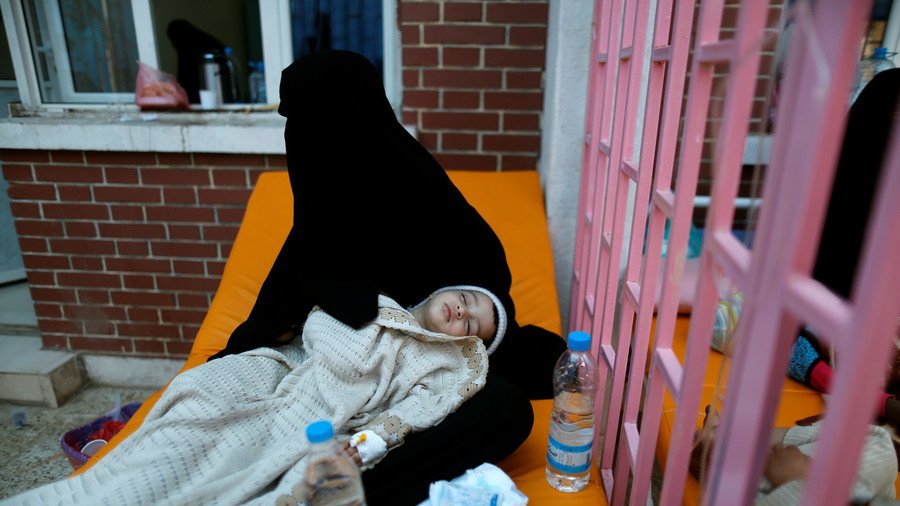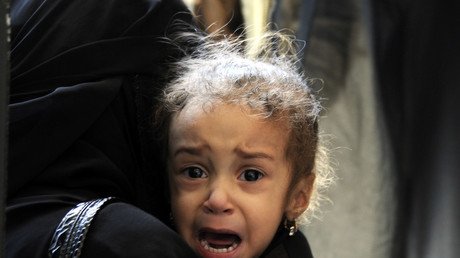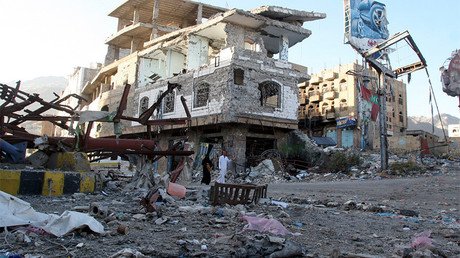'Devastating’: Yemen’s cholera endemic hits 1mn mark

Yemen’s cholera outbreak has surpassed the 1 million mark while 300 cases of diphtheria have been reported as civilians in the war-ravaged country continue to face starvation and a crippling blockade.
“We can confirm that the country has now reached 1 million suspected cases of cholera,” the International Committee of the Red Cross said. “This is devastating.”
Shocking: 1 million suspected #cholera cases in #Yemenpic.twitter.com/0lCMRsxps1
— ICRC Yemen (@ICRC_ye) December 21, 2017
#Yemen cholera update:We can confirm that the country has now reached 1 million suspected cases of cholera. This is devastating.
— ICRC (@ICRC) December 21, 2017
The World Health Organization has recorded 2,226 deaths since the epidemic began in April. Cholera causes severe diarrhea and dehydration and is spread by dirty water and the contamination of food with feces. It can cause death within hours if untreated.
The ICRC also said over 80 percent of Yemen is in need of food, clean water, healthcare and fuel. The country is in the grips of a brutal war, with a Saudi-led coalition of nine countries conducting airstrikes against the Houthi rebels in support of President Abdrabbuh Mansour Hadi, who fled the country in 2015.
The Houthis were in alliance with long-running former President Ali Abdullah Saleh, who they killed in December after indicating he was changing sides and seeking dialogue with the Saudis.
2017 ‘didn’t look good’ but 2018 will bring more wars, famine & extremism – NGO. https://t.co/X0rfjqBhvC
— RT UK (@RTUKnews) December 2, 2017
The Houthi rebels are supported by Iran, which is also accused of supplying weapons to the group, a charge which Iranian Foreign Minister Mohammad Javad Zarif described as “baseless accusations,” on Wednesday.
Saudi Arabia has imposed a blockade on the country, which has further intensified the food and aid shortage. On Wednesday, it said it would keep the rebel-controlled port of Hodeidah open for 30 days to allow humanitarian deliveries to get into the country.
In January, the UN Office for the Coordination of Humanitarian Affairs said the civilian death toll had reached 10,000, citing data gathered by health facilities, and said the actual number could be much higher.
Saudi Crown Prince bin Salman voted Time readers’ person of the year https://t.co/Wh5Aav87E4pic.twitter.com/tSKLJde6Kp
— RT (@RT_com) December 6, 2017
The United Nations on Tuesday said coalition airstrikes had killed at least 136 civilians between December 6 and 16.
“We urge all parties to the conflict to respect their obligations under international humanitarian law, including their obligation to respect the principles of distinction, proportionality and precaution,” Rupert Colville, spokesperson for the Office of the UN High Commissioner for Human Rights (OHCHR) said.“They should take all feasible precautions to avoid, and in any event to minimise, the impact of violence on civilians.”
#Yemen today after more than two years of conflict:• 22.2 million need humanitarian aid• 17.8 million without adequate food• 2 million forced to flee for their lives• 60,000+ killed or injured• Cholera and diphtheria pic.twitter.com/xxg3YEZFca
— UNHCR Yemen (@UNHCRYemen) December 21, 2017
Meanwhile, MSF announced in Geneva on Thursday the country also faces a diphtheria outbreak, with more than 300 cases reported. “In Yemen, the last diphtheria case was recorded in 1992, and the last outbreak in 1982,” MSF Emergency Coordinator said. “The ongoing war and blockade is sending Yemen’s health system decades back in time.”
🔴 LIVE NOW: So far the 300 #diphtheria cases that are reported are the start of the epidemic. It is a frightening situation as there is high vulnerability in the country. Without proper containment now, it could increase significantly. #YemenCrisis@msf_yemen
— MSF International (@MSF) December 21, 2017














